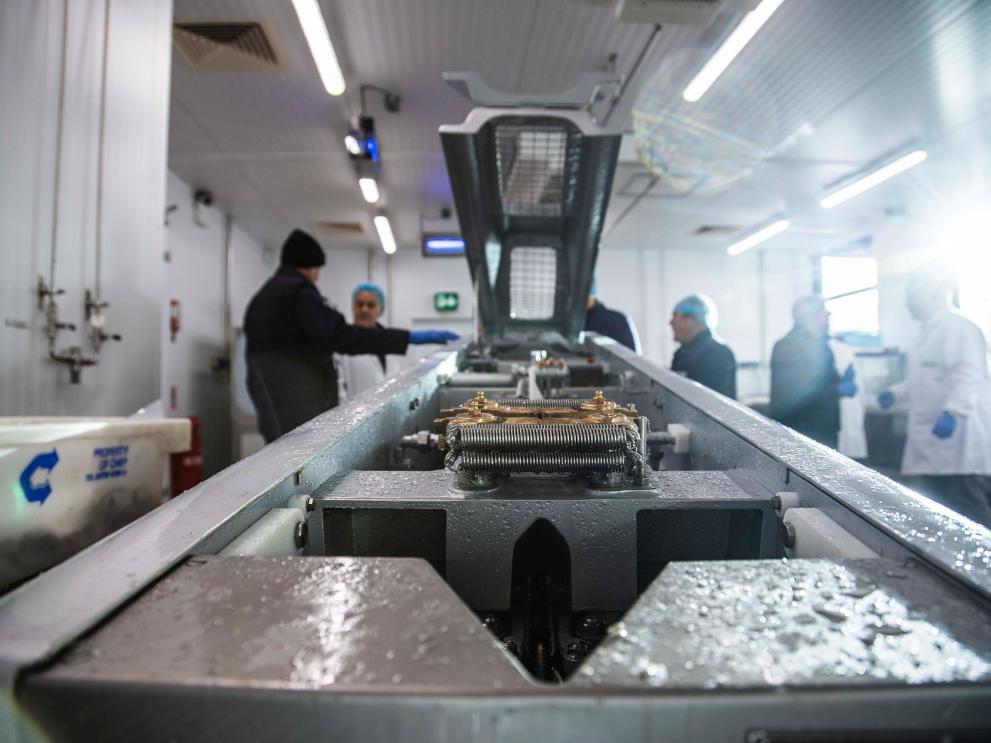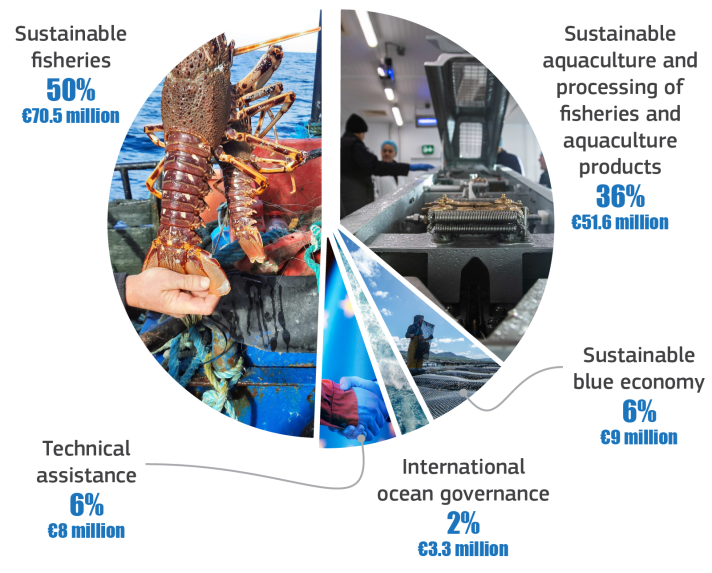
Following the adoption of the Partnership Agreement 2021-2027 with Ireland, the Commission has adopted the European Maritime, Fisheries and Aquaculture Fund (EMFAF) programme for Ireland, to implement the EU common fisheries policy (CFP) and EU policy priorities outlined in the European Green Deal. The total financial allocation for the Irish programme 2021-2027 is €258.4 million, of which the EU contribution accounts for €142.4 million.
Commissioner for Environment, Oceans and Fisheries, Virginijus Sinkevičius, said:
I am delighted to announce the adoption of the EMFAF programme for Ireland. The programme aims to boost the resilience of the entire seafood sector, to accelerate its green transition, as well as to support the coastal communities. The programme will also enhance knowledge to deal with climate change and impacts on marine biodiversity.
Supported activities
50% of the programme allocation will be dedicated to sustainable fisheries and conservation of aquatic biological resources, 36% will be invested in sustainable aquaculture and in processing and marketing, 6% will be dedicated to sustainable blue economy in coastal areas and 2% will be invested in the strengthening of international ocean governance, all contributing to the EU’s environmental and climate objectives.
The main focus of the programme will be towards:
- Sustainable fisheries: investments to build resilience of the fishery sector to the current challenges; energy efficiency and reduce carbon emissions in the fishing fleet; on-board and on-shore investments to comply with the landing obligation; investments in fishing vessels to improve health, safety and working conditions on board; action to develop skills in the seafood sector; support to control and data collection activities; actions to reduce marine litter; actions to support marine biodiversity, including the designation and management process of Natura 2000 sites and marine protected areas.
- Sustainable aquaculture and processing of fisheries and aquaculture products: research and innovation; investments in sustainable aquaculture, including developing cultivation techniques that support biodiversity; actions to increase the competitiveness of the processing sector; energy efficiency and decarbonisation in aquaculture and the processing sector; actions tackling marine litter and applying circular economy principles in the aquaculture and processing sectors.
- Sustainable blue economy (i.e. economic activities related to seas and oceans): development and economic diversification of coastal and island areas through Local Action Groups (LAG).
- International ocean governance: strengthening sustainable sea and ocean management through the promotion of marine knowledge, including improved understanding of the impacts of human activities and climate change on the environment and their cumulative effects.
Main expected outcomes until 2027
The Irish EMFAF programme will contribute to the EU policy priorities outlined in the European Green Deal, Farm to Fork and Biodiversity strategies.
The programme aims to boost the resilience of the fisheries, aquaculture and processing sectors, through promoting research, innovation and knowledge transfer, skills development and also the use of modern technologies. Marketing activities are another important path to support the development of the sector. The programme provides for support of temporary cessation of fishing activities in case of natural disasters, environmental incidents or health crises and also emergency support for the seafood sector in case of significant market disruption.
The programme will accompany the seafood sector in its green transition. Support to research and innovation aiming at decarbonisation, replacement or modernisation of fishing vessels’ engines to reduce carbon emissions in the Irish fleet and reach its goals on climate change mitigation and adaptation. Based on the budget allocations, the programme contributions to fight climate change and protect the environment represent respectively 58% and 68% of the total EU allocation, which is well above the 30% target for climate contribution set in the EMFAF Regulation. The contribution of the programme to biodiversity amounts to 25%.
The digital transition of the entire seafood sector is a strategic focus area of the programme. It includes the development of digital skills and capacity for professionals in the sector to take up new technologies and implement the digital transformation in the Irish fleet, in particular its small-scale coastal fleet and to maximise the use of digital technology to enhance control and enforcement of the CFP, through digital catch reporting and traceability systems.
The programme will also support specific actions to improve the management of marine protected areas (MPA), as well as to fight against marine litter. This will include continued support for the designation and management of Natura 2000 sites and MPAs, development and use of more selective fishing gear, restoration of habitats and species, appropriate fisheries control and enforcement, control of invasive marine species, tackling plastic pollution, increase awareness of the Natura/MPA network.
The Irish EMFAF programme will support the development of the coastal economies and their diversification into other areas of the blue economy. This will be done through the implementation of the community-led local development (CLLD) strategies, a bottom-up approach to policy development that encourages local partnerships to form a Local Action Group (LAG) and take initiatives to support their local development.
Background
The EMFAF runs from 2021 to 2027 and supports the EU common fisheries policy (CFP), the EU maritime policy and the EU agenda for international ocean governance. The fund helps achieve sustainable fisheries and conserve marine biological resources.
Article 8 of the EMFAF Regulation (EU) 2021/1139 requires Member States to produce a national implementation programme for the EMFAF. This programme focuses on EU priorities, laying down the strategy and investment priorities, including the indicative annual financial allocation for each priority. The programme is subject to approval by the European Commission.
More information
Regulation (EU) 2021/1060 of the European Parliament and of the Council of 24 June 2021 laying down common provisions on the European Regional Development Fund, the European Social Fund Plus, the Cohesion Fund, the Just Transition Fund and the European Maritime, Fisheries and Aquaculture Fund and financial rules for those and for the Asylum, Migration and Integration Fund, the Internal Security Fund and the Instrument for Financial Support for Border Management and Visa Policy.
Details
- Publication date
- 9 December 2022
- Author
- Directorate-General for Maritime Affairs and Fisheries

